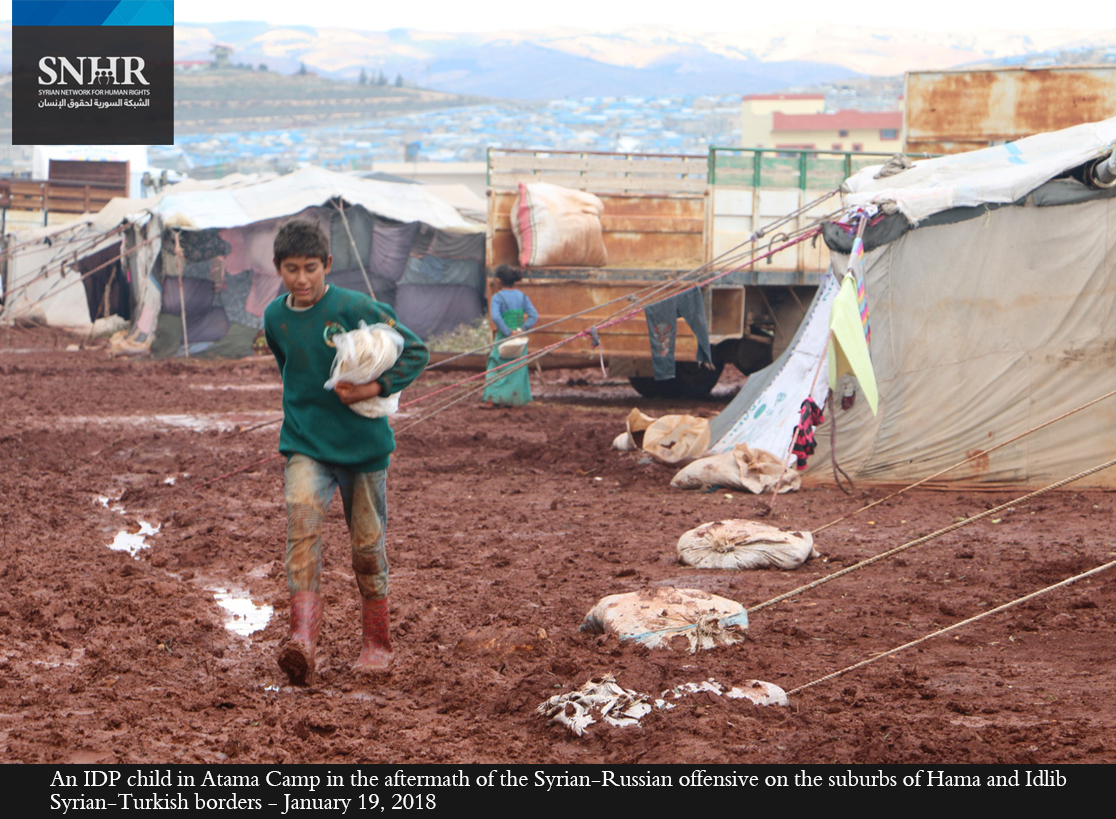Blatant Coordination between the Syrian-Iranian Alliance and ISIS

SNHR said in a report released today that no less than 485,00 people have been displaced from the suburbs of Hama, Idlib, and Aleppo in light of the Russian-Syrian alliance’s progression which came after an explicit coordination between the Syrian-Iranian alliance and ISIS.
The report notes that Russian-Syrian alliance started carrying out heavy airstrikes following the sixth round of Astana talks. This was followed by raids on the villages in eastern suburbs of Hama that saw the involvement of Iranian militias. Military operation then expanded to eastern and southern suburbs of Idlib and southern suburbs of Aleppo. According to the report, Syrian-Russian alliance forces used incendiary ammunitions, cluster munitions, chemical weapons, and highly-explosive missiles in populated areas. Also, the offensive saw the use of Kalibr missiles by the Russian warships in the Caspian Sea.
The report adds that there has been a very visible coordination between Syrian regime forces and ISIS which was clear during the battles in eastern suburbs of Hama and then eastern and southern suburbs of Idlib. The report notes that Syrian regime forces never targeted ISIS in the group’s areas of control that are adjacent to the Syrian regime’s, but rather facilitated the passage of ISIS’s troops towards clash lines with Hay’at Tahrir al Sham and factions from the armed opposition. Also, the report tecords that Syrian regime forces passed through ISIS’s areas of control with no resistance.
According to the report, the heavy indiscriminate attacks carried out by the Syrian-Russian-Iranian alliance forces, as well as the artillery shelling by ISIS, have resulted in the displacement of no less than 485,00 residents from the areas of eastern suburbs of Hama, eastern and southern suburbs of Idlib, and southern suburbs of Aleppo. Most of the IDPs headed for northern and western suburbs of Idlib, where camps and shelters suffered from huge pressure, as those are built with vastly less capacity that what they ended up receiving.
Fadel Abdul Ghany, chairman of SNHR, says:
“One could easily conclude how residents are afraid of the new controlling forces, namely Syrian regime forces and ISIS, considering the routes IDPs took. Why would those residents flee rather than welcome those forces otherwise? Hundreds of thousands of people have been forced to leave their homes and jobs in fear of the Syrian regime’s and ISIS’s terrorism. They would rather live with no homes than fall into their hands.”
The report documents the most notable violations of human rights in eastern suburbs of Hama eastern and southern suburbs of Idlib between September 19, 2017 and February 15, 2018, where Syrian-Russian-Iranian alliance forces killed no less than 204 civilians, including 40 children and 46 women (adult female). Among the victims were 17 civilians who were killed as they were trying to flee. The report also records no less than 191 attacks on vital civilian facilities, including 21 attacks on medical facilities and 11 attacks on refugee camps. In addition, the report records no less than 12 attacks using cluster munitions and six attacks using incendiary ammunitions where most of these attacks were carried out by Russian forces. Additionally, the report records one attack using chemical weapons by the Syrian regime.
The report also outlines the most notable violations of human rights in southern suburbs of Aleppo, as Syrian-Russian-Iranian alliance forces killed 49 civilians, including 13 children and 12 women (adult female), between mid-November 2017 and February 15, 2018. Among the victims were seven civilians, including one female child and two women, who were killed as they were trying to flee. In addition, Syrian-Russian-Iranian alliance forces carried out no less than seven attacks on vital civilian facilities, including one attack on a medical facility in the same period of time.
The report stresses that Syrian-Russian-Iranian alliance forces have, beyond any doubt, violated Security Council Resolutions 2139 and 2254 which both state that indiscriminate attacks must be ceased. Also, these forces have violated Article 8 of Rome Statute through the act of willful killing which constitutes war crimes.
The report adds that Syrian-Russian-Iranian alliance forces have perpetrated the crime of forced displacement through the military operations they have carried out which affected approximately 485,000 people who are living under extremely dire conditions. In addition, Syrian regime forces didn’t secure any shelters or alternative residencies for the IDPs, nor they facilitated the displacement movement or secured safe passages.
The report calls on the Security Council to adopt a binding Resolution that prevents and punishes the crime of forced displacement, and puts an end to the forced displacement operations, while explicitly states that IDPs have the right to a safe return to their homes, and that the damages that have befallen their homes should be redressed. Additionally, the report calls on the Security Council to compel the Syrian regime to cease settlement and demographic replacement operations in the cities and neighborhoods whose residents have been displaced.
Moreover, the report stresses that enforced displacement is a threat to the region and the Syrian lands that will shake security and stability. Instilling peace and security in Syria is a core part to the responsibilities of the Security Council.
The report calls on the OHCHR to help with establishing a central data for residencies and properties in Syria in order to achieve compensation and carry out voluntary return programs in accordance with the UN’s “Principles on Housing and Property Restitution for Refugees and Displaced Persons” known as the Pinheiro Principles.
The report stresses that the Russian regime should stop shielding the Syrian regime at the Security Council and using veto to prevent the passing of any international resolution that punishes the Syrian regime.
The report urges International relief organizations to find the necessary ways to secure water, food, and shelter for thousands of homeless people in northern and western suburbs of Idlib and western suburbs of Aleppo.


